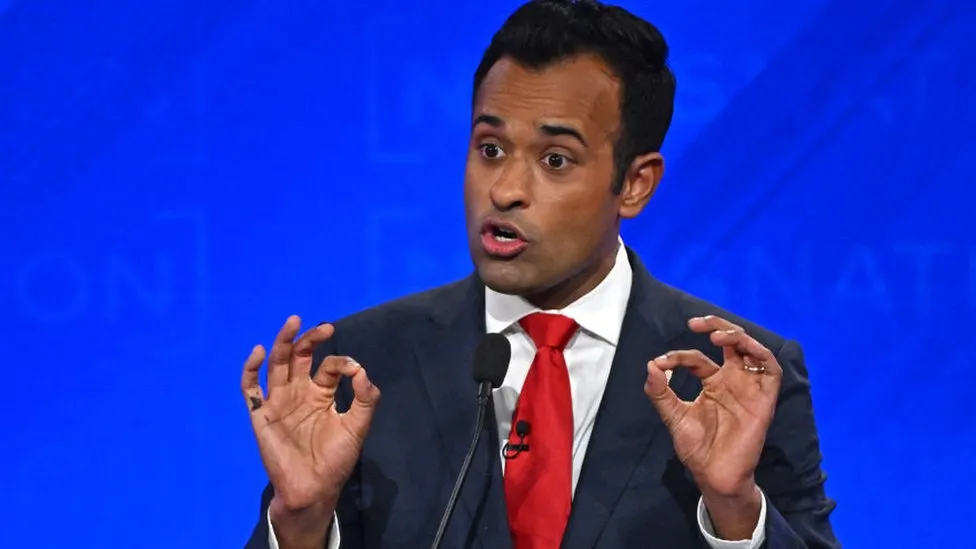Why is Republican candidate Vivek Ramaswamy doubling down on conspiracy theories?
Vivek Ramaswamy is increasingly talking about conspiracy theories, a move that some experts say is a last-ditch effort to boost his poll numbers.

The biotech entrepreneur called the January 2021 Capitol riot an "inside job" during a CNN town hall event this week.
It comes after the Republican candidate repeated a series of fringe ideas during presidential debates.
Mr Ramaswamy says he's battling government lies.
But the debunked, sometimes confusing ideas he embraces are more common on far-right message boards than presidential debate stages.
On the CNN broadcast, he asserted Capitol rioters were victims of "entrapment".
"If you had told me three years ago...in any way that January 6 was an inside job, the subject of government entrapment, I would have told you that was crazy talk, fringe conspiracy-theory nonsense," he said.
"I can tell you now, having gone somewhat deep in this, it's not."
He then repeated a false narrative found in far-right spaces online: protesters were "invited" into the Capitol and the riot was somehow staged or instigated by federal agents rather than happening as a chaotic outburst by Donald Trump's supporters.
Debate stage
Experts say his conspiracy thinking marks a potential point of difference between the political newcomer and his more established rivals - at least the ones that he has so far been debating.
With a month to go until the first primary contests, most polls put him in a distant fourth place for the Republican nomination, behind Mr Trump, Ron DeSantis and Nikki Haley.
Mr Ramaswamy's latest CNN appearance continued along the lines of themes he previously brought up during a Republican debate last week.
"Why am I the only person on the stage at least who can say that January 6th now does look like it was an inside job?" he asked.
Then he switched over to another far-right idea about immigration promoted by white supremacists.
"The 'great replacement' theory is not some grand right-wing conspiracy theory, but a basic statement of the Democratic Party's platform," he contended.
He also said: "The 2020 election was indeed stolen by Big Tech."
It is unclear what Mr Ramaswamy meant by some of those statements, but the phrases he used do have specific meanings.
"Great replacement" is the far-right idea that a cabal of people - often named as "globalists", "elites" or Jews - is deliberately plotting to change the demographics of Western countries. The theory alleges this is being done through immigration, interracial marriage, reducing the birth rate and other means.
It is a version of the "white genocide" conspiracy theory that there is a plot to entirely "eliminate" white people. That idea has been mentioned in documents left behind by several racially motivated attackers, including mass shooters in El Paso, Texas, and Buffalo, New York, as well as Christchurch, New Zealand.
Whether Mr Ramaswamy is aware of that background is unclear. His campaign did not respond to requests for comment.
Following the debate, however, the unorthodox candidate reposted a message from a popular white nationalist account on X and vaguely commented that "the left" was "intentionally facilitating mass illegal migration".
Capitol riot misinformation
The false contention that federal authorities somehow planned or executed the Capitol riot is a mainstay of far-right spaces online.
Despite more than 1,000 arrests and hundreds of convictions, Mr Ramaswamy, like many conspiracy theorists, has claimed that the presence of confidential law enforcement sources among some of the extremist groups in the crowd proves the government had a hand in orchestrating the unrest.
Conspiracy believers often muddle the idea of confidential sources with law enforcement agents and ignore both the huge amount of evidence introduced during one of the biggest investigations in US history and the large volume of social media videos and photos showing demonstrators in pitched battles with police.
Mr Ramaswamy alternatively claims that the protesters were goaded into rioting as victims of "entrapment" and that they were "invited" into the Capitol building.
Mr Ramaswamy's statements have won him the support of a number of influential characters on the far right, who see any attention as an advancement of their cause.
There also could be a political advantage in talking up ideas that allegedly aren't covered by the "mainstream media."
Cynthia Wang, a professor at Northwestern University and expert in conspiratorial beliefs, says Mr Ramaswamy's open discussion of conspiracy storylines is to be expected in the current political climate.
"He might actually believe in these theories, but there is also a benefit in using them, because it helps people - his potential supporters - make sense of the world," she says. "Using this powerful language is actually very attractive for people during uncertain times… More rational explanations don't have the same punch."
Mike Rothschild, a journalist and author of the book Jewish Space Lasers: The Rothschilds and 200 Years of Conspiracy Theories, says Mr Ramaswamy - who enjoyed a spike in presidential polling before stalling in recent months - is looking beyond the primaries.
"He knows the clock is running out on his presidential campaign, but it's just starting on a bigger career in media that revolves around building a fan base that believes in conspiracy theories," he says.
Mr Ramaswamy has used his campaign podcast to cultivate that fan base. During a recent chat with notorious conspiracy theorist Alex Jones, he expressed sympathy for Mr Jones losing a defamation lawsuit brought by Sandy Hook school shooting victims.
Ms Wang says Mr Ramaswamy has little to lose by bringing up fringe ideas in a race where the frontrunner - Mr Trump - promotes conspiracy theories.
"I can see this as a Hail Mary, but if it doesn't work and he does lose, he's still supporting the overall cause in the Republican Party," she says, "because a lot of what he is saying aligns with what Trump is saying."
-bbc







